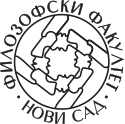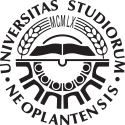15SFSF006 - Introduction to Linguistics 2: Foundations of Language Studies
| Course specification | ||||
|---|---|---|---|---|
| Course title | Introduction to Linguistics 2: Foundations of Language Studies | |||
| Acronym | 15SFSF006 | |||
| Study programme | Serbian Philology: Serbian Language and Literature | |||
| Module | ||||
| Type of study | first degree undergraduate academic studies | |||
| Lecturer (for classes) | ||||
| Lecturer/Associate (for practice) | ||||
| Lecturer/Associate (for OTC) | ||||
| ESPB | 5.0 | Status | ||
| Condition | Oblik uslovljenosti | |||
| The goal | Mastery the knowledge on the organization of the science of language and its development. | |||
| The outcome | The student mastered basic knowledge about the organization and development of language science. | |||
| Contents | ||||
| Contents of lectures | I. The structure of language science: 1. Definitions and disciplinary determinants: Title (philosophy, rhetoric, glotology, grammar, philology, linguistics), subject, method, terms, terms and symbols, theories and hypotheses, goals and status, 2. Classification by width and generality of the abstraction (micro and macrolinguistics), type of manifestation, level of study (linguistic discipline), and theoretical-methodological ("directions" in linguistics). II. A short history of language science: 1. Ancient times - India and Greece, 2. From the Romans to the 18th century, 3. The science of language in the HIH century, 3.1. Comparatives and juniors, 3.2. Wilhelm von Humboldt, 3.3. Biological naturalism, 3.4. Boduen de Kurtene, 4. The science of language in the 20th century, 4.1. Structural linguistics, 4.1.1. Ferdinand de Sosir and the Geneva School, 4.1.2. Roman Jakobson and the Prague School, 4.1.3. Louis Hjelmslev and Copenhagen School, 4.1.4. American structuralism, 4.2. Noam Chomsky and Generative linguistics (basics), 4.3. Interdisciplinary Linguistics, 4.3.1. Antropolinguistics, 4.3.2. Psycholinguistics, 4.3.3. Sociolinguistics. | |||
| Contents of exercises | An insight into the selected most important literature and its interpretation. | |||
| Literature | ||||
| ||||
| Number of hours per week during the semester/trimester/year | ||||
| Lectures | Exercises | OTC | Study and Research | Other classes |
| 2 | 0 | |||
| Methods of teaching | Method of oral presentation; conversation method (dialog method); method of demonstration | |||
| Knowledge score (maximum points 100) | ||||
| Pre obligations | Points | Final exam | Points | |
| Activites during lectures | Test paper | 60 | ||
| Practical lessons | Oral examination | |||
| Projects | ||||
| Colloquia | 40 | |||
| Seminars | ||||

